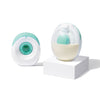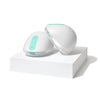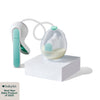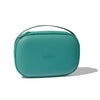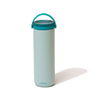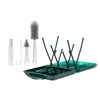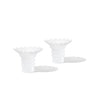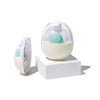Everything you need to know about moms’ favorite pump — designed to fit better, feel good, optimize milk production, and protect your supply over time.
At Willow, we’ve always believed that moms deserve better on their breastfeeding journeys. That they shouldn’t have to sacrifice freedom for comfort and milk output. That they should be able to meet their pumping goals without pain or discomfort.
This conviction is why we built the Willow Go — and why it has earned moms’ trust (and won so many awards) in the years since. The proof is in the numbers:
- 9/10 moms say Willow Go is just as, if not more, comfortable than their traditional pump
- 8/10 moms say Willow Go is more comfortable than other wearable pumps
- 7/10 moms say Willow Go gives better milk output than other wearable pumps
- 7/10 moms choose Willow Go as their primary pump — no wall pump needed
The secret? A clinically tested pump design that puts the care of moms’ nipples and breasts above all else, and creates the conditions for optimal pump performance (and more milk!) in turn. Because more pumping comfort is directly connected to more milk output and a healthier supply over time. Here’s how we do it.
Inside the Willow Go
When we set out to engineer a pump that would feel good and make more milk, we focused on a few key areas: the flange, the motor, and the levels of suction. First, let’s dive into the flange.
While it may seem like an insignificant pump part, the flange couldn’t be more important to your overall pumping success. A flange is a one-shaped funnel, typically ending in a tunnel, that seals over your nipple and breast and creates a vacuum to transmit milk. Flanges exist in different sizes because nipples vary in size from person to person and even from breast to breast. We like to say that they’re sisters — not twins!
If your flange is too large, you’ll have less pressure on the alveoli and less stimulation overall, which can result in insufficient emptying. If your flange is too small, your nipple may rub against the tunnel, causing discomfort, pain, and compressed milk ducts that restrict emptying. This can also lead to painful conditions like plugged ducts and even mastitis, which can throw your feeding plan off track.
In the longer term, an improperly fitted flange can reduce three important things: stimulation, the hormonal rush of oxytocin that triggers letdown and milk production, and milk capacity. In other words, your supply could drop.
This is why we’ve taken so much care when designing our flanges. If you’re comparing them to those that come with another wearable, you’ll notice:
A smoother, longer flange funnel
Much of Willow Go’s comfort can be attributed to the depth of its flange tunnel, which you’ll notice is longer than that of most other wearables. While this has a small impact on the pump’s discretion (the profile is slightly higher as a result), it also means that the nipple is less likely to crash into the end of the flange. This is especially important for moms with elastic nipples, which stretch during a pumping or feeding session and can be easily bruised by a pump that doesn’t fit.
This also allows for suction that more closely mimics a baby’s natural latch. When babies nurse, they pull the nipple all the way back to their soft palate near the throat — in other words, it stretches a lot! This is why so many moms say that pumping with Willow feels similar to the way their baby breastfeeds.
Willow Go’s flange is also unique because of its smooth surface. Whereas many flange tunnels are “interrupted” by a diaphragm or duckbill, Willow Go’s flange tunnel is totally continuous — assuring no nipple abrasion and mimicking baby’s suckling motion more closely.
A curved, wide flange cone
When comparing Willow Go to other wearables, you’ll also notice a difference in the shape of the flange itself — specifically, the curved edges that wrap back around the pump. This design is more optimized for comfort than a flange with a flat, cone-shaped edge, which runs the risk of pinching and pulling skin.
A circular donut-shaped motor
Our second — but equally as important — area of focus when designing a pump that felt good was the motor.
We know that it had to be an interior motor: first, so that the pump could fit fully-in bra with a shape that mimicked the breast, and second, so that the pump was weighted more evenly around the nipple. Unsurprisingly, external motors that sit on top of pumps are top heavy — pulling the nipple in an unnatural direction and impacting proper suction.
What resulted is an innovative, donut-shaped motor that wraps around the pump, allowing for both discretion and better weight distribution.
Multiple levels of customizable suction
It’s a major pumping misconception that “strength” or “power” equals more output. On the contrary, it’s possible to make your most milk without maxing out your suction speed and intensity. What matters is finding the right suction for your body, and choosing a pump that can be customized for each breast.
Most lactation consultants will encourage moms to choose the lowest possible suction level and speed that allows for optimal milk production. This ensures that you’re being gentle on your breasts and nipples while fully emptying your breasts — a win-win.
Beyond design: where flange fit comes into play
Product design is just one piece of the puzzle. If you’re not wearing the right-size flange, you won’t see optimal output. In other words: pumps are not one size fits all!
Willow Go is compatible with 21mm, 24mm, and 27mm flanges, as well as sizing inserts that can create a more snug and comfortable fit if your nipples measure smaller than 21mm. How to know which size is right for you? Start by measuring your nipples, which you can find step by step instructions for here. You’ll want to do this when you start pumping and any time that you notice a change in your comfort or output over time!
If you’re pumping with the Willow 360 or Willow Go, you can also book a complimentary session with a Willow Mom Coach. (Yes — this is how committed we are to helping you master comfort and output!) They are Lactation Educators and experts on all things sizing, and can help you measure your nipples, experiment with different flange and insert sizes, and optimize output through proper alignment. They’ll even help you find the right bra! (If your flange fits well, but your bra is too loose, you may still deal with less than optimal output.)
Pump comfortably and make more milk with Willow Go.
It’s possible to find a pump that fits, feels good, and sets the stage for your most milk production and a healthy supply over time and that pump is Willow Go. Shop now and join the movement of moms who trust their breastfeeding journeys to Willow!
Tags Used
